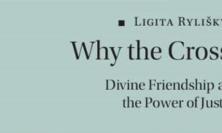In her book, Immaculée Ilibagiza shares the power of faith in God through her moving experience of the Rwandan genocide. God saved her life for a reason. “He left me to tell my story to others and show as many people as possible the leading power of his Love and Forgiveness” (208-09). Her book proves that “with God all things are possible”. Her objective is not to give a historical account of Rwanda and/or of the genocide. She gives her own story. She attests that through God’s help, forgiveness is possible – even to those who killed her parents. Her book is meant to help people to let go of the chains of hatred and anger, and be able to truly live in God who is love. Left to Tell is a breathtaking book that proves the fact that “the love of a single heart can make a world of difference” (210). The book is divided into three parts, and each part into eight chapters. The author recounts how God saved her from the shadows of death and helped her discover who He really Is.
The first part of the book gives an account of Immaculée’s family background. The love she experienced from her parents and her three brothers is illustrated. Her parents cared for everybody, particularly the poor. Because of the love with which she grew up, she never realised that she was living in a country where hatred against the Tutsi, her tribe, was rampant. It was not until she was asked to stand up in class by her teacher during an ethnic roll call that she realised that her neighbours were not what she thought them to be – good and friendly. After struggling to get into high school and university, not because she was not qualified but because of discrimination against her ethnic background, she worked hard to prove that if women are given opportunities to develop their potential, they can do tremendously well. Yet as she grew up, hatred in Rwanda also grew and became a reality, as she writes: “too many mornings, I awoke to the sound of hatred” (37). As the war between the Rwandan Patriotic Front and the then government intensified, both politicians and the Rwandan media ‘preached’ that the enemy was Immaculée’s ‘tribe.’ Yet she never ceased to love everyone. In fact, many of her good friends were Hutus. Her parents too were ‘blind’ to the reality of hatred around them. They believed that nothing would harm them, given that they had done good things for their neighbours. When Habyarimana’s presidential plane was shot down on 6 April 1994, all that Immaculée’s parents believed was proven false. All she experienced from her neighbours as she grew up turned out to be like “a gathering storm” which anticipated a heavy “rain” to befall Rwanda – the genocide. This seems to the reason why she entitled the first section of her book, “A Gathering Storm.”
In the second part, Immaculée narrates her horrifying experience of the genocide. God became her father, mother, brother, her everything, in a tiny bathroom where she hid from the killers for months. When the genocide began, Immaculée’s father asked her to go to hide at the house of Pastor Mulinzi – a family friend – with her brother Vianney, and Augustin, Immaculée’s friend who was a Hutu but looked like a Tutsi. Mulinzi accepted them into his house, but when things became tough, he chased Vianney and Augustin away and kept Immaculée with five other women. Mulinzi hid them in a tiny bathroom. Every corner of his house was searched many times by the killers, the Interahamwe (youth militia trained for killing), but it seemed that God blinded them, preventing them from discovering the bathroom. The six women wished to be like birds and fly, but God had not created them so. They were at the mercy of Mulinzi who, once in a while, brought them food late at night when everyone else in his house was asleep. The only thing Immaculée had was her rosary, which her father gave her before they separated. She prayed it ceaselessly. Outside the bathroom, stories were being shared of how her parents and relatives were killed. She had to deal with fury and had no one to speak to, not even the other women as they were under strict orders not to utter a word. She could not stomach the pain of staying in the house of somebody who chased away her brother. Yet it is in Mulinzi’s bathroom that Immaculée discovered God amidst the Rwandan Holocaust. She discovered God after many temptations from the devil who wanted her soul to be imprisoned by vengeance. She prayed for thousands of Tutsi who had been murdered, and prayed for their killers to come into God’s powerful light and be changed by his love: “Touch them with your Divine Love, God. Only then will they drop their machetes and fall to their knees. Please, God move them to stop their slaughter. Forgive them” (105). After this prayer, things were never the same. Immaculée discovered God’s light and remained in it.
But how was she to remain in this light? She taught herself English and found the power of positive thinking. She was determined to have a “why” to live. She realised that the loss of human freedoms is the lack of an alternative. But she had one: teach herself English and work at the United Nations in the future, as she is doing now. This achievement was beyond belief – to teach herself English in a bathroom where nobody spoke a word and where she did not know whether she would be alive the next second! She kept faith, like Jesus, in the one who could save her – God.
The third part of the book marks a new era in the life of Immaculée and her relationship with God. First of all, she had to deal with the ‘pain’ of freedom. The time came for her and her friends to come out of the bathroom. Pastor Mulinzi led the women to the French camp in the hope of saving them. However what began ‘well’, as Pastor had kept these women in his bathroom, did not end well! Mulinzi abandoned them when he saw the Interahamwe coming towards the women, and only God knows how their lives were saved. God saved them, like Daniel, from the mouth of a hungry lion. He blinded the killers and the women were able to bypass them. They finally reached the French camp and for a short time, they felt saved. Yet this was short-lived. On their way to the rebels’ camp, the French soldiers also abandoned them in the midst of the Interahamwe. Immaculée had entered into an alliance with God, and God kept his promise. “I held my rosary and summoned all my will to send a message of love to [one Interahamwe]. I prayed that God would use me to touch the killer with the power of his love… we stared at each other’s eyes for what seemed like a lifetime. Finally, the killer broke my gaze and looked away…” (172). God again saved her and her friends, and they finally embarked on the remainder of their journey to the rebels. Her journey towards the rebel camp was like moving in the valley of death. Finally, she and her companions arrived at the rebel camp and they were helped to regain their energy. She began “A New Path.” How would she face the reality of being alone, without her family? Would she really be able to forgive? Did God really have a reason to spare her life? What would be her next mission in this New Path? To what extent would she be able to appreciate Mulinzi’s help and/or forgive him, after he let her brother die and abandoned her and her friends in the midst of the Interahamwe? These were just some of the many questions that were on Immaculée’s mind. “God left me to tell my story to others and show as many people as possible the healing power of His love and forgiveness” (208-9). She met face to face with the killer of her own mother and brother, and forgave him: “he looked up at me for only a moment, but our eyes met. I reached out, touched his hands lightly, and quietly said what I’d come to say. ‘I forgive you.’” (204). For her, forgiveness is all she had to offer. Indeed her message is, “anyone in the world can learn to forgive those who have injured them, however great or small that injury may be.” (209) The new mission of the author of Left to Tell is to restore hope to the hearts of genocide survivors, particularly the orphaned children.
This book is written in clear language for everyone to experience God’s power of love and forgiveness. Its target audience is everybody who wants to discover God, particularly those who ask themselves where God is when ‘evil’ surrounds them. It is recommended to all, but particularly to Rwandans, in our ongoing process of healing, justice and reconciliation. Left to Tell is a story of a personal encounter with God. It proves the power of love nurtured by prayer. Indeed, the words of Saint Paul are echoed in this book: “Love conquers all!” (1 Corinthians 13: 1-13)
The reviewer, Marcel Uwineza SJ, is a Rwandan Jesuit, assistant co-ordinator at the African Jesuit AIDS Network in Nairobi.
![]() Left to Tell at Hay House Publishers
Left to Tell at Hay House Publishers
![]() Left to Tell – Immaculée Ilibagiza’s website
Left to Tell – Immaculée Ilibagiza’s website






